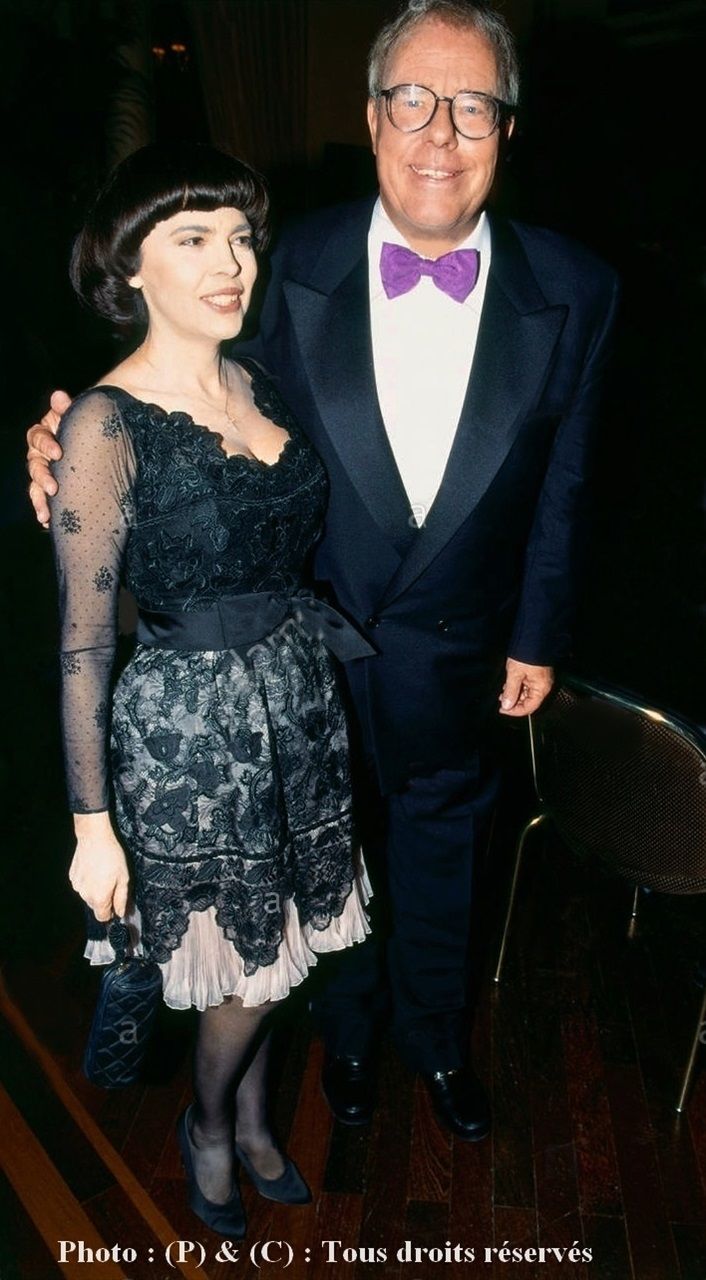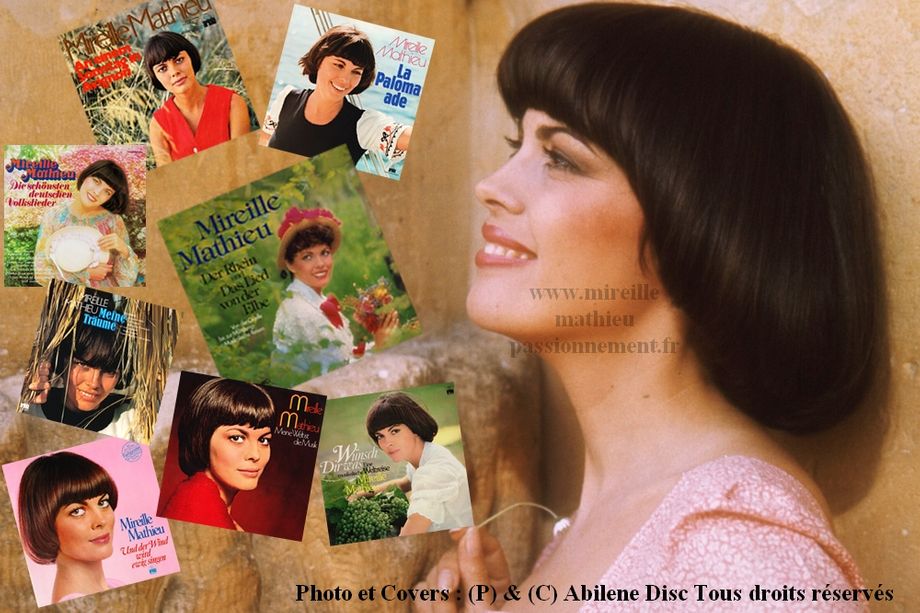Hinter den Kulissen von Paris, Meine Welt ist die Musik, Der Pariser Tango, Martin, Santa Maria, Ganz Paris ist ein Theater, Der Zar und das Mädchen, La Paloma ade, Es geht mir gut chéri, Akropolis adieu et tant d'autres... ça vous dit quelque chose ?
Bien évidemment ! Toutes ces merveilleuses compositions ont été créées par un des plus grands compositeurs allemands qui a su habiller Mireille sur-mesure et la propulser au sommet des charts en Allemagne mais également en France après l'adaptation de ses chansons en français !
Je voulais remercier ce monsieur, je lui ai donc écrit un mail et à ma grande surprise, j'ai reçu une réponse pleine d'humilité et de gentillesse. J'ai alors tenté ma chance pour obtenir une interview qu'il a tout simplement acceptée avec plaisir.
Alors ce monsieur dont les compositions nous ont fait voyager du Sahara à Istanbul, De Rome à Moscou, sur les bords du Rhin et de l'Elbe n'est autre que Monsieur Christian Bruhn !
Pour mieux le connaître : http://www.christianbruhn.de/
Photos Covers : (P) & (C) ABILENE DISC Tous droits réservés
-INTERVIEW-
1 / Votre meilleur souvenir avec Mireille Mathieu ?
Les deux tout premiers enregistrements en 1969 : "Hinter den Kulissen von Paris" et "Martin" : Sa grande joie et assiduité à chanter dans une langue étrangère à la sienne, son énergie et sa musicalité unique.
2/ « Meine Welt ist die Musik » est votre chanson préférée, pourquoi ? Une ou deux autres s'il vous plaît ?
C'est vrai pour Mireille Mathieu comme pour moi, c'est en quelque sorte notre..Credo
La ligne mélodique, les harmonies classiques, l’arrangement.
Sinon, "Winter in Canada" et "Wunder gibt es immer wieder“
(3e place à l'Eurovision 1970) pour Katja Ebstein.
3/ Avez-vous des souvenirs de l'enregistrement du LP « Der Rhein und Das Lied von der Elbe « comment cette idée vous est-elle venue, était-ce un projet auquel vous pensiez depuis longtemps ?
« Der Rhein und Das Lied von der Elbe » sont ce que j'appelle des "Suites cantabiles", les cycles sont une sorte de "Moldau" chantée.
L'idée est venue de l’auteur Georg Buschor, et j'ai eu le plaisir d'écrire pour un grand orchestre.
La performance de Mireille lors de l’enregistrement est fantastique, sa délicatesse est inégalée.
4/ Vos chansons parlent souvent de différents pays (Andalucia, Hong Kong,Sahara,Ein brief aus Istanbul, Korsica, Roma Roma Roma etc….)
Est-ce à cause de souvenirs personnels ou juste votre imagination avec la complicité de Georg Buschor ?
Ces chansons populaires abordent toutes sortes de thèmes de la vie, de sentiments, y compris l'amour mais aussi l’environnement, les villes et les paysages.
Et pour une chanteuse comme Mireille qui a la faculté de s’approprier chaque chanson, d’y mettre son âme , elle réussit par cela, à retranscrire tout parfaitement, même des thèmes exotiques.
5/ Lorsque vous composez pour Mireille, comment expliquez-vous ce qui vous inspire chez elle ?
Tout compositeur est heureux lorsqu'il trouve une interprète comme Mireille qui ne se contente pas seulement de chanter ses chansons, mais qui les crée, les remplit
d'amour et de vie, c'est ce qui inspire le compositeur à son tour pour inventer d'autres chansons "sur mesure" autant que possible.
6
/ A votre avis, pourquoi le public allemand a-t-il adopté Mireille ?
C'est très simple : une personnalité charmante et une voix claire et unique.
et des chansons bien choisies - les Allemands n'ont pas pu résister.
7 / Quel est votre secret pour avoir composé
autant de mélodies qui restent éternellement dans nos mémoires ?
Pour son don de la musicalité ou l'invention de mélodies originales qui traversent le temps
le compositeur ne peut rien faire,
ces dons viennent de Dieu.
8 / Une
dernière question, que représente Mireille pour vous ?
La plus haute et absolue représentation de la chanson de variété.
Hinter den Kulissen von Paris…
Meine Welt ist die Musik,, Der Pariser Tango, Martin,
Santa Maria, Ganz Paris ist ein Theater Der Zar und das Mädchen,La Paloma ade, Es geht mir gut, chéri, Akropolis adieu und so viele andere... sagt Ihnen das etwas?
Natürlich tut es das! Alle ihre wunderbaren Kompositionen stammen von einem der größten deutschen Komponisten, der es verstand, Mireille nach Maß zu kleiden und sie nach der Adaption ihrer Lieder auf Französisch an die Spitze der
Charts in Deutschland, aber auch in Frankreich zu katapultieren!
Ich wollte mich bei diesem Herrn bedanken, also schrieb ich ihm eine E-Mail und zu meiner großen Überraschung
erhielt ich eine Antwort voller Demut und Freundlichkeit. Ich habe dann mein Glück versucht, ein Interview zu bekommen, das er einfach gerne angenommen hat.
Dieser
Herr, dessen Kompositionen uns von der Sahara nach Istanbul, von Rom nach Moskau, an die Ufer von Rhein und Elbe führten, ist also kein anderer als Monsieur Christian Bruhn !
Für weitere Informationen : http://www.christianbruhn.de/
Photos Covers : (P) & (C) ABILENE DISC Tous droits réservés
-INTERVIEW-
1
/ Ihre beste Erinnerung mit Mireille Mathieu?
Die allerersten zwei Aufnahmen 1969: „Hinter den Kulissen von Paris“ / „Martin“: Ihr
ungeheurer Fleiß beim Singen in der Fremdsprache Deutsch, ihre nicht nachlassende Energie und ihre einmalige Musikalität.
2/ "
Meine Welt ist die Musik " ist Ihr Lieblingslied warum ? Ein oder zwei weitere bitte?
Das gilt ja für Mireille Mathieu wie auch für mich, das
ist sozusagen unser Credo. Der langgezogene Bogen der Melodie, die klassischen Harmonien, das Arrangement. – „Winter in Canada“, „Wunder gibt es immer wieder“
(Platz 3 Eurovision 1970)
3/ Haben Sie Erinnerungen an die Aufnahme von " Der Rhein und das Lied von der Elbe" ..
und wie sind Sie auf diese Idee gekommen, war es ein Projekt, über das Sie schon lange nachgedacht hatten ?
„Rhein“ und „Elbe“ nenne ich Suites cantabiles, die Zyklen sind gewissernaßen eine Art von gesungener „Moldau“ (Smetana). Die Idee kam von Textdichter Georg Buschor, und ich hatte das Vergnügen, wieder einmal für großes Orchester zu schreiben. Mireilles Leistung ist phantastisch, ihr Zartgefühl ist beispiellos.
4/ In Ihren Liedern geht es oft um verschiedene Länder ( Andalucia
, Hong Kong , Sahara , Ein brief aus Istanbul , Korsika , Roma , Mamuschka usw.... liegt das an den Erinnerungen an diese persönlichen Länder oder an Ihrer Fantasie mit der Mitschuld des Autors Georg Buschor ?
Das populäre Lied greift nun einmal alle möglichen Themen aus dem Leben auf, dazu gehört die Liebe wie auch Stadt und Landschaft. Und für eine Sängerin, die derart
gestalten kann wie Mireille – da bieten sich sogar exotische Themen an.
5/ Wenn Sie für Mireille komponieren, wie erklären
Sie sich, was Sie an ihr inspiriert ?
Jeder Komponist ist beglückt, wenn er eine Interpretin findet, die seine Lieder nicht nur nachsingt, sondern gestaltet, also mit Liebe und Leben erfüllt, das wiederum inspiriert ihn, weitere möglichst „auf den Leib geschneiderte“ Songs zu erfinden.
6 / Ihrer Meinung nach , warum die deutsche Öffentlichkeit Mireille adoptiert hat ?
Ist doch ganz einfach: Die liebenswerte Persönlichkeit und die klare und einmalig schöne Stimme und dazu die passenden Lieder – da konnten die Deutschen gar nicht widerstehen.
7 / Was ist dein Geheimnis , wenn sie all diese Melodien komponiert haben , die ewig an unseren Erinnerungen festhalten ?
Für seine Begabung der Musikalität und der Erfindung von merkfähigen und originellen Melodien kann der Komponist ja nichts, diese Gaben kommen vom lieben Gott.
8 / Noch eine letzte Frage , Was repräsentiert Mireille für Sie ?
Die absolute Hochkultur der Unterhaltungsmusik
Hinter den Kulissen von Paris, Meine Welt ist die Musik, Der Pariser Tango, Martin, Santa Maria, Ganz Paris ist ein Theater, Der Zar und das Mädchen, La Paloma ade, Es geht
mir gut chéri, Akropolis adieu and so many others... does that ring a bell?
Of course it does! All these wonderful compositions were created by one of the greatest
German composers who knew how to dress Mireille to measure and propel her to the top of the charts in Germany but also in France after the adaptation of her songs in French!
I wanted to thank this gentleman, so I wrote him an email and at my great surprise, I received an answer full of humility and kindness. then I tried my luck to get an interview which he simply accepted with pleasure.
So this gentleman whose compositions have taken us from the Sahara to Istanbul, from Rome to Moscow, on the banks of the Rhine and the Elbe is none other than Mr Christian Bruhn!
To know him better : http://www.christianbruhn.de/
-INTERVIEW-
1 / Your best memory with Mireille Mathieu?
The very first two
recordings in 1969: "Hinter den Kulissen von Paris" and "Martin": Her great joy and assiduity in singing in a foreign language, her energy and unique musicality.
2/ "Meine Welt ist die Musik" is your favourite song, why? One or two others please?
It's true for Mireille Mathieu as well as for me, it's kind of our...Credo. The melodic line, the classical harmonies, the arrangement.
Otherwise,
"Winter in Canada" and "Wunder gibt es immer wieder"
(3rd place at Eurovision 1970) for Katja Ebstein.
3/ Do you remember the recording of the LP "Der Rhein und Das Lied von der Elbe"?
"Der Rhein und Das Lied von der Elbe" are what I call "Suites cantabiles", the cycles are a kind of "Moldau" sung.
The
idea came from the author Georg Buschor, and I had the pleasure of writing for a large orchestra.
Mireille's performance on the recording is fantastic, her delicacy
is unequalled.
4/ Your songs are often about different
countries (Andalucia, Hong Kong, Sahara, Ein brief aus Istanbul, Korsica, Roma Roma Roma etc....)
Is it because of personal memories or just your imagination
with the complicity of Georg Buschor?
These folk songs deal with all kinds of life themes, feelings, including love but also the environment, cities and landscapes.
And for a singer like Mireille who has the ability to make each song her own, to put her soul into it, she succeeds in transcribing everything perfectly, even exotic themes.
5/ When you compose for Mireille, how do you explain what inspires
you in her?
Every composer is happy when he finds a performer like Mireille who doesn't just sing her songs, but who creates them, fills them with love and life, and
this in turn inspires the composer to invent other "tailor made" songs as much as possible.
6 / In your opinion, why did the German public adopt
Mireille?
It's very simple: a charming personality
and a clear, unique voice.
And well-chosen songs - the Germans couldn't resist.
7 / What is your secret for having composed so many melodies that remain forever in our memories?
For his gift of musicality or the invention of original melodies that stand the test of time
the composer can do nothing, these gifts come from God.
8 / One
last question, what does Mireille represent for you?
The highest and absolute representation of easy listening.
Mireille & Christian
Remerciements à Christoph Toubartz et Hubert Tartasse pour les traductions.







